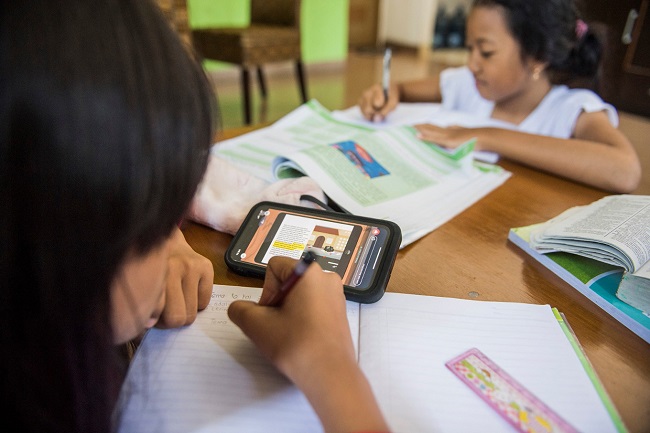The experiences of Indonesian migrant mothers in NZ’s pandemic reveal that the ideals of Ibuism endure
Nelly Martin-Anatias, et al.
Arriving in Aotearoa New Zealand (NZ henceforth), many Indonesian mothers, like other migrants, have high hopes for their new lives, especially in relation to educational opportunities for their children. Like parents around the world, for these women the global pandemic meant a re-negotiation of their roles, particularly around home schooling.
NZ entered its first national lockdown in March 2020, with the most stringent restrictions (‘Level 4’) in place for 33 days. During this period, everyone was required to stay at home, with few exceptions. Everyone had to re-navigate their lives. Working parents were now working-from-home, and school children needed to be home-schooled. We talked to eight Indonesian women living in NZ – all of them heterosexually married, and with children – to get a sense of how their lives were being affected by the lockdown. The women all had different reasons for moving to NZ. Some were accompanying their husbands; others were pursuing their own academic degree. Aside from the two postgraduate mothers, the participants each had different levels of English proficiency, including a few without even a basic level of English. When it came to teach their children during the lockdown home schooling, this basic or ‘everyday’ English turned out to be insufficient.
Most of the migrant mothers we interviewed were full-time housewives and mothers (Ibu Rumah Tangga, literally means ‘the mother of the household’), aside from the doctoral students who were both housewives and full-time post-graduate students. They all found the lockdowns led to their having to take increased responsibility for looking after the household and teaching their children.
In the beginning, not all the mothers foresaw the challenges. Intan, a fulltime housewife, initially approached the additional burden positively:
You know, [as] Ibu RT [Ibu Rumah Tangga - literally Mother of the Household and can mean a stay-home wife and mother], at first I was happy to learn that my children were all at home. But then, I was becoming aware that I spent too much time preparing their meals from breakfast to dinner. When I was done with the breakfast, I only had limited time to cook for their lunch, then, later on, they’d asked me for their school lessons, after that I needed to get ready for their dinner. We [(Indonesian) mothers] didn’t have time for ourselves, you know. …So, in brief, my time was largely spent taking care of them [the children].
While being aware that her time was spent mostly on taking care of the children, she never explicitly complained about this. If anything, she blamed herself for her struggles, implying she was at fault for ‘spending too much time’ on meal preparation. The tasks she had taken on were all seen as reasonable and integral to her role as an ‘ibu rumah tangga’. In many ways this is not surprising: as the feminist writer Julia Suryakusuma has argued, Indonesian state ideologies of Ibuism (‘Motherism’) have long positioned the roles of ‘wife’ and ‘mother’ as integral to women’s destiny (kodrat).
Failing to perform well in these roles could lead to them being referred to as ‘imperfect’ (wanita yang kurang/tak sempurna), a label that is readily available to stigmatise them. Thus, as they found themselves in lockdown, with no access to support from friends, family, or domestic workers, Intan and the other Indonesian mothers we spoke to did not complain about their ever-growing to-do lists but set about fulfilling their new responsibilities to the best of their abilities.
The challenge of home schooling
In NZ, as elsewhere around the world where there were lockdown restrictions in place, children’s schooling went online. While it was relatively short-lived in NZ, the burden experienced by these migrant mothers was particularly intense, physically, mentally and linguistically. For mothers like Intan, there was the added challenge of teaching their children in a language (English) with which they were not necessarily comfortable.

While the NZ government and schools supported parents by furnishing them with lesson plans, laptops, and Internet access, there was no support for parents whose fluency in English made home schooling linguistically challenging. This linguistic discrimination is uncovered during the lockdown while they need to attend to their children’s home schooling. Dewi recounted how difficult home schooling could be for her as a non-native English speaker:
It was hard especially for us, who are used to learning the concepts in Indonesian, [to teach] in a different language. Here, I needed to teach (my child) in English. So, I had to learn the language (English) first, then after that, I had to learn the materials. It was hard, especially the literacy, because I have a very limited English.
To make sure she could teach well, Dewi took at least ‘one teaching day’ to teach herself prior to instructing her child. Maths, Literacy/Reading and Writing, were the lessons she found most difficult to understand, let alone to teach. Similar sentiments were shared by Intan. While Maths was not an issue for her, Literacy/Reading and Writing were. Indeed, aside from the two participants who were doctorate students, all the mothers we spoke to explicitly stated that teaching their children in a foreign/second language was not easy. Indeed, they found it to be stressful and challenging.
Physical fatigue was another challenge the mothers experienced. For Saras’ son, before lockdown school time was fun and it was also pleasant for Saras, as she had some free time. However, lockdown home schooling was a different story, as she needed to stay focused on her nine-year-old child for almost the whole day. She said that this new role led to stress and headaches (pusing). When asked about the husband’s contribution, both she and her husband said that teaching has always been the wife’s speciality, although he was also staying at home and receiving the government subsidy due to his type of work. As reported from cases around the world, during lockdowns, home schooling, and other domestic work, appears to have largely fallen under the woman’s responsibilities.
Appreciation and inspiration
Not all aspects of home schooling during the lockdown were negative for these mothers. For Lintang, home schooling was time-consuming, but it gave her an opportunity to discover what her eight-year was learning in school. She appreciated the hard work her husband was doing on a daily basis as a breadwinner for their family and felt that lockdown had also allowed her own efforts to receive due recognition from her husband. He had thanked her for the meals she had provided during the lockdown, Lintang cheerfully recounted, even though she still needed to assume the teaching roles in addition to her daily household chores. Another mother, Lia, shared a similar story of how her husband had explicitly conveyed his gratitude for her hard work during the lockdown. The mothers were grateful that their roles in keeping their families together during the difficult time were appreciated.

While the added domestic chores and their new role as a teacher could be daunting and frustrating, some also found an inspiring role model in the form of New Zealand’s Prime Minister Jacinda Ardern. That Ardern was PM and also a mother, meant they could identify with her. Some believed that if Ardern could shoulder these additional lockdown tasks while still being a mother, then they could do it too. As Saras revealed, ‘I am a mum (ibu), and she is a new mum (ibu baru) who has a baby. …. She is actually a PM. But I feel like she knew my problem [that I am tired and can’t do anything related to myself]. She knew all the ibu-ibu’s problems here.’
Notably, none of the women mentioned the role of Ardern’s partner, once dubbed ‘the world’s most famous stay-at-home dad’, nor the support she would have received from her parents, who had moved in with her for the lockdown. Instead, these women constructed a sense of Jacinda Ardern as the ultimate ‘ibu rumah tangga’, from whom they could take inspiration. This ‘Jacinda’ of whom they spoke was in many ways a projection of the Ibuism ideology to which they themselves subscribed – but her presence on their screens and in their consciousness allowed them to maintain their sense of Indonesian womanhood - being a good mother and a dedicated wife - while living in their adopted country.
Being Indonesian in NZ during the pandemic
For the Indonesian migrant mothers we spoke to, domestic and childrearing tasks fall under their kodrat (destiny) as a woman and as a mother. Many assume childrearing is a gendered role for women only, such that men’s involvement is seen as extraordinary and highly appreciated. While being physically and mentally exhausted, Indonesian migrant mothers showed great determination and devotion towards their family and importantly, their children’s education. They acted in ways consistent with the Indonesian ideology of Ibuism and assumed the role of a mother who acted as the linchpin for her family members’ wellbeing, without little if any (explicit) complaint.
Their narratives tell that the mothers prioritised their family members’ wellbeing over their own. Thus, even though they were often felt physically exhausted, mentally frustrated and linguistically challenged, they could still find some satisfaction in knowing that their children and their husbands were well taken care of. Several of them emphasised how ‘thankful’ they felt to be in NZ – a country that at the time the study was conducted in May-June 2020, had successfully adopted an elimination strategy and had avoided another national lockdown. Such gratitude, however, was marked with ambivalence, as they were sad and concerned to see how their home country was dealing with the pandemic. They were worried about their extended families and relatives on a daily basis, as the Indonesian government adopted an approach of mitigating the spread of COVID-19, rather than eliminating it, leading to repeated outbreaks of infections across Indonesia.
Perhaps, they felt lucky to be in NZ and therefore would just accept the barriers they experienced and not dare to ask for more. And yet, as speaking with them revealed, there were ways in which they could have been much better supported by their partners and the NZ government (as well as educational charities and NGOs) to support the challenges they faced with home schooling as second-language speakers. Their stories are ones of persistence, inspiration, appreciation and accomplishment – but they nevertheless also shed light on persistent inequalities to which government ministers and Indonesian expat communities in NZ (and beyond) should give serious thought ahead of future pandemics and lockdowns.
Dr. Nelly Martin-Anatias is a Research Fellow at the School of Social Sciences and Public Policy Auckland University of Technology. Dr. Nicholas J. Long is Associate Professor of Anthropology at the London School of Economics and Political Science. Associate Professor Sharyn Graham Davies is the Director of the Herb Feith Indonesian Engagement Centre at Monash University in Melbourne. Dr. Pounamu Jade Aikman is a Māori scholar of Ngāti Awa, Ngāi Te Rangi, and Ngāti Maniapoto descent. Dr. Nayantara Sheoran Appleton is a Senior Lecturer at the interdisciplinary Centre for Science in Society, Victoria University of Wellington. Dr. Antje Deckert is a Senior Lecturer in Criminology at Auckland University of Technology. Dr. Edmond Fehoko has a Master’s degree in Social Sciences and a PhD in Public Health in the field of gambling addiction from the Auckland University of Technology. Professor Eleanor Holroyd, is a medical nurse anthropologist, and Head of Research in Clinical Sciences, Co-Director of the Centre for Migrant and Refugee Studies. Naseem Jivraj is a PhD student at the London School of Economics and Political Science. Megan Laws is a Fellow in the Department of Anthropology at the London School of Economics and Political Science. Dr. Michael Roguski is Director of Kaitiaki Research and Evaluation. Nikita Simpson is a PhD Candidate in Anthropology at the London School of Economics. Dr. Rogena Sterling has completed a LLB, LLM and a PhD. Dr. Susanna Trnka is an Associate Professor in Anthropology at the University of Auckland. Dr. Laumua Tunufa’i lectures in Criminology at New Zealand’s Auckland University of Technology.
The interviews for this research were conducted by the lead author, Dr. Nelly Martin-Anatias in May-June 2020. This piece is drawn from the ‘Lockdown Ibuism: Experiences of Indonesian Migrant Mothers during the COVID-19 Pandemic in Aotearoa New Zealand’ publication that is accessible here and is part of our CARUL (Care And Responsibility Under Lockdown) larger research project.












